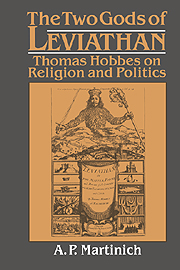Book contents
- Frontmatter
- Contents
- Acknowledgments
- A note on references
- Dedication
- INTRODUCTION
- PART I THE RELIGIOUS BACKGROUND TO HOBBES'S PHILOSOPHY
- Chapter 1 CONSIDERATIONS UPON THE REPUTATION AND RELIGION OF MR. HOBBES
- Chapter 2 RELIGION
- PART II LAW, MORALITY, AND GOD
- PART III RELIGION WITHIN THE LIMITS OF SCIENCE AND POLITICS
- Conclusion
- Appendix A Curley on Hobbes
- Appendix B Skinner on Hobbes
- Appendix C The frontispiece to Leviathan
- Notes
- Bibliography
- Index
Chapter 1 - CONSIDERATIONS UPON THE REPUTATION AND RELIGION OF MR. HOBBES
Published online by Cambridge University Press: 30 December 2009
- Frontmatter
- Contents
- Acknowledgments
- A note on references
- Dedication
- INTRODUCTION
- PART I THE RELIGIOUS BACKGROUND TO HOBBES'S PHILOSOPHY
- Chapter 1 CONSIDERATIONS UPON THE REPUTATION AND RELIGION OF MR. HOBBES
- Chapter 2 RELIGION
- PART II LAW, MORALITY, AND GOD
- PART III RELIGION WITHIN THE LIMITS OF SCIENCE AND POLITICS
- Conclusion
- Appendix A Curley on Hobbes
- Appendix B Skinner on Hobbes
- Appendix C The frontispiece to Leviathan
- Notes
- Bibliography
- Index
Summary
Natus erat nosier servator Homo-Deus annos Mille et quingentos, octo quoque undecies.
(O.L., 1:lxxxv)THE USE OF THE TERM “ATHEISM”
Since few philosophers today think that Hobbes was an atheist, proving that he was a theist is not a pressing matter. Nonetheless, investigating the grounds for the charge against him will motivate the introduction of certain methodological principles that are commonly used in interpreting Hobbes's works. Unlike Nietzsche and Sartre, for example, Hobbes never says that he is an atheist. To the contrary, he affirms his belief in God on many occasions. The case against him, then, is at best indirect. It is based upon inferences that his contemporaries and scholars have made about his work.
One piece of prima facie evidence that Hobbes was an atheist is the fact that some of his contemporaries called him an atheist. But this is not strong evidence. The term “atheist” was used indiscriminately in Hobbes's day as a term of abuse, as some observers of the contemporary scene recognized. In his essay “Of Atheism,” Francis Bacon wrote, “[A]ll that impugn a received religion, or superstition, are, by the adverse part, branded with the name of atheists.” An article in a newspaper edited by Marchamont Nedham says that the priests “call every thing that squares not with their corrupt Clergy-Interest” atheism (Mercurius Politicus, no. 84, January 8–15, 1652). A theologian who was trying to improve the theoretical underpinnings of Christianity was especially likely to be tagged an atheist.
- Type
- Chapter
- Information
- The Two Gods of LeviathanThomas Hobbes on Religion and Politics, pp. 19 - 39Publisher: Cambridge University PressPrint publication year: 1992



